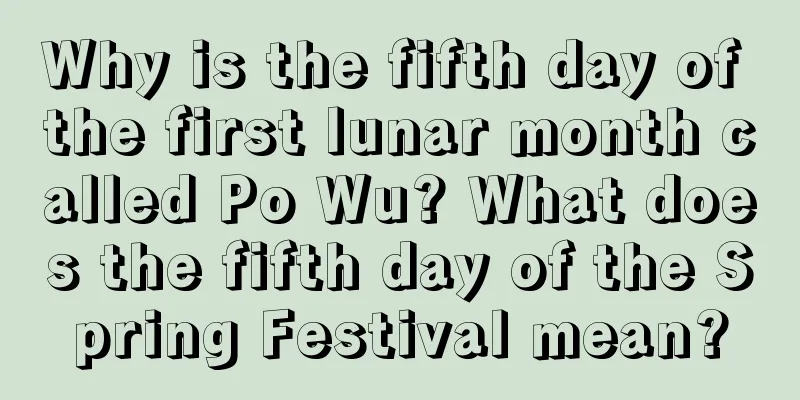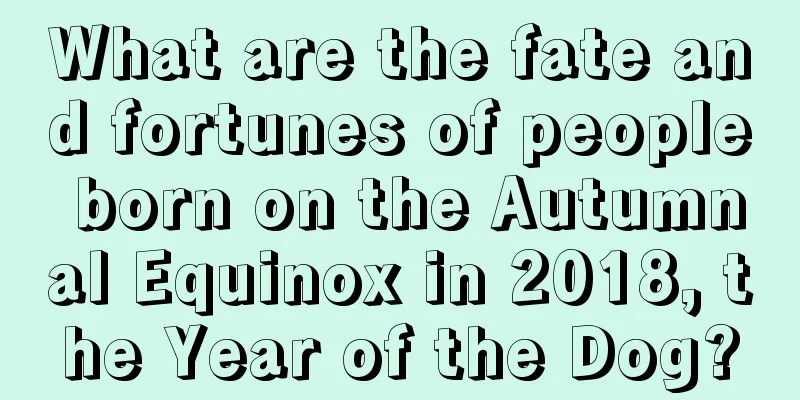Why is the fifth day of the first lunar month called Po Wu? What does the fifth day of the Spring Festival mean?

The fifth day of the first lunar month is also one of the days in the first lunar month. So, let’s take a look at why the fifth day of the first lunar month is called Po Wu? Coming from the disastrous 2020, the arrival of the first month of the lunar calendar brings new hope to many people. Come to Shuimoxiansheng.com to check out more articles about the fortune for the first month of 2021.Why is the fifth day of the first lunar month called Po Wu?The fifth day of the first lunar month, commonly known as Po Wu Festival, is one of China's traditional festivals with a long history. It gets its name from the fact that Chinese folk customs believe that many previous taboos can be broken on this day. Since this day carries too many hopes and aspirations of the people, there were many taboos on this day in ancient times. For example, people had to eat dumplings, could not cook with raw rice, and women were not allowed to visit neighbors. "Yanjing Sui Shi Ji" said: The fifth day of the lunar month is called "Po Wu". During this period, no raw rice can be used for cooking and women are not allowed to go out. On the sixth day, princesses, noble ladies, eunuchs and others came and went in their attire and congratulated each other. Newly married women also returned home on the same day, and merchants gradually resumed their trade. The Qing Dynasty Bi Lei Chao also states: "The fifth day of the first lunar month is called Po Wu, and women are not allowed to go out.In addition to the above taboos, the customs of the fifth day of the New Year mainly include sending away poverty, welcoming the God of Wealth, and opening the market for trade. Many habits have changed according to different customs in different regions. People love novelty and dislike old things, and seek good luck, but when fireworks are set off, it will be difficult for middle-aged people, the elderly or children who are fast asleep at this time. In addition, too many gases that are harmful to health are emitted at this time every year. In some places in the south, people only burn incense and offer tea on this day, but do not set off fireworks. However, times have changed and customs have changed. What does the fifth day of the Spring Festival mean?The first statement about the Spring Festival:The fifth day of the first lunar month is the birthday of the God of Wealth, so people have big banquets, set off firecrackers, and hold various celebrations on this day, all with the intention of welcoming the arrival of the God of Wealth. The second theory of Spring Festival breaking the fifth day: In some places, the fifth day is called "Yuannian", which means that the new year is over and this day is the day to make a summary and put an end to it. In fact, this is a variation of "Po Wu", which evolved slowly due to the lack of knowledge of the origin of "Po Wu". According to "Investiture of the Gods", Jiang Ziya conferred the title of "Goddess of Poverty" on his wife who betrayed him, and ordered her to "return home when she encounters Po Wu". In myths and legends, Jiang Ziya’s wife was a very annoying woman who betrayed her husband. After she was made the God of Poverty, she became even more annoying. I’ve never heard of anyone liking the God of Poverty, right? So people would "break" her on the fifth day of the New Year and let her "go back immediately" - go back right away! |
Recommend
Will a boy born on November 13, 2021 in the lunar calendar have a good life?
Fate is our innate nature, a fixed value at birth....
Can I sign a contract on the fourth day of the third lunar month in 2019? What is my fortune?
Signing a contract is a very serious matter and ma...
What is the zodiac sign for people born on the sixth day of the twelfth lunar month in the Year of the Rat 2020?
What is the zodiac sign for people born on the six...
Is it a good idea to get a haircut on October 24, 2020 in the lunar calendar? Is it an auspicious day?
Is it a good idea to get a haircut on October 24, ...
Will the career luck of those born in the Year of the Ox be good when they go back to work after the holidays? good luck?
Introduction: Career luck is very important for ev...
Is it a good idea to move to a new house on July 11, 2018 in the lunar calendar?
It is not until the seventh month of the lunar ca...
What is the fate of those born on National Day in the Year of the Rooster? Is your fortune going well?
National Day is an important festival to celebrate...
How do the Buyi people celebrate the sixth day of the sixth lunar month? Where does Juneteenth come from?
The sixth day of the sixth lunar month is a tradit...
Is it a good idea to get married, engaged, and get a marriage certificate on the third day of the third lunar month in 2019?
Shuimoxiansheng.com provides you with more conten...
Is July 16th of the lunar calendar 2020 an auspicious day? What are the taboos in Ghost Month?
An auspicious day is a folk culture and a unique t...
Is a child born on April 15, 2019 in the lunar calendar a Taurus?
Introduction: Everyone has his or her own zodiac s...
What date is the 27th day of the 12th lunar month in 2019?
What date is the 27th day of the 12th lunar month...
What is the lunar calendar date for August 16th, 2018? Is it a good time to travel far away?
Introduction: China has been a traditional country...
What are the Feng Shui taboos that should be paid attention to when sweeping tombs and worshiping ancestors during the Qingming Festival?
Introduction: The festival culture of Qingming Fes...
Is it a good time to travel on May 19th of the lunar calendar in 2022? Is it a good day to go on a trip?
Is it a good time to travel on May 19th of the lun...









